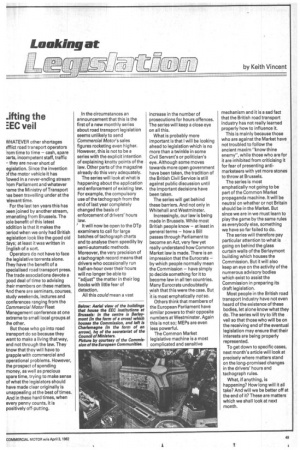.ifting the EEC veil
Page 43

If you've noticed an error in this article please click here to report it so we can fix it.
NHATEVER other shortages ifflict road transport operators rrom time to time cash, spare )arts, incompetent staff, traffic they are never short of egislation. Since the invention yr the motor vehicle it has lowed in a never-ending stream 'rom Parliament and whatever name the Ministry of Transport as been travelling under at the -elevant time.
For the last ten years this has )een joined by another stream, amanating from Brussels. The sole benefit of this latest addition is that it makes the period when we only had British egislation look like the good old lays; at least it was written in English of a sort.
Operators do not have to face the legislative torrents alone. They have the benefit of a specialised road transport press. The trade associations devote a good deal of time to advising their members on these matters. And there are seminars, courses, study weekends, lectures and conferences ranging from the Commercial Motor Fleet Management conference at one extreme to small local groups at the other.
But those who go into road transport do so because they want to make a living that way, and not through the law. They know that they will have to grapple with commercial and operational problems. However, the prospect of spending money, as well as precious spare time, trying to make sense of what the legislators should have made clear originally is unappealing at the best of times. And in these hard times, when every penny counts, it is positively off-putting. In the circumstances an announcement that this is the first of a new monthly series about road transport legislation seems unlikely to send Commercial Motor's sales figures rocketing even higher. However, this is not to be a series with the explicit intention of explaining knotty points of the law. Other parts of the magazine already do this very adequately.
The series will look at what is happening about the application and enforcement of existing law. For example, the compulsory use of the tachograph from the end of last year completely changed the basis of enforcement of drivers' hours law.
A It will now be open to the DTp examiners to call for large batches of tachograph charts and to analyse them speedily by semi-automatic methods. Moreover, the very precision of a tachograph record means that drivers who occasionally run half-an-hour over their hours will no longer be able to "adjust" the matter in their log books with little fear of detection.
All this could mean a vast increase in the number of prosecutions for hours offences. The series will keep a close eye on all this.
What is probably more important is that I will be looking ahead to legislation which is no more than a twinkle in some Civil Servant's or politician's eye. Although some moves towards more open government have been taken, the tradition of the British Civil Service is still against public discussion until the important decisions have been taken.
The series will get behind these barriers. And not only in Whitehall and Westminster.
Increasingly, our law is being made in Brussels. While most British people know at least in general terms how a Bill passes through Parliament to become an Act, very few yet really understand how Common Market law is made. There is an impression that the Eurocrats by which people normally mean the Commission have simply to decide something for it to become law in all ten countries. Many Eurocrats undoubtedly wish that this were the case. But it is most emphatically not so.
Others think that members of the European Parliament have similar powers to their opposite numbers at Westminster. Again this is not so; MEPs are even less powerful.
The Common Market legislative machine is a most complicated and sensitive mechanism and it is a sad fact that the British road transport industry has not really learned properly how to influence it.
This is mainly because those who are against the Market have not troubled to follow the ancient maxim "know thine enemy", while those who are for it are inhibited from criticising it for fear of presenting antimarketeers with yet more stones to throw at Brussels.
The series is most emphatically not going to be part of the Common Market propaganda machine. It will be neutral on whether or not Britain should be in the Market. But since we are in we must learn to play the game by the same rules as everybody else, something we have so far failed to do. The series will therefore pay particular attention to what is going on behind the glass curtain walls of the Berlaymont building which houses the Commission. But it will also keep an eye on the activity of the numerous advisory bodies which exist to assist the Commission in preparing its draft legislation.
Most people in the British road transport industry have not even heard of the existence of these bodies, let alone know what they do. The series will try to lift the veil so that those who will be on the receiving end of the eventual legislation may ensure that their interests are being properly represented.
To get down to specific cases, next month's article will look at precisely where matters stand on the long-promised changes in the drivers' hours and tachograph rules.
What, if anything, is happening? How long will it all take? And will we be better off at the end of it? These are matters which we shall look at next month.


















































